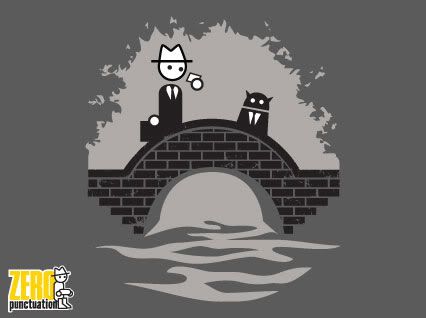Or: How I Learned To Stop Worrying and Love Critics

Criticism isn’t something you should fear.
Even if it’s not meant to be constructive, criticism can be used to shore up your work. There will always be someone out there who will test your work for flaws and point them out for you. Some even manage to make a pretty good living doing it. Roger Ebert and Yahtzee come to mind.
Critics aren’t just educated sadists, either. More often than not, they’re tearing something apart to uncover its flaws so that consumers who agree with their points of view won’t end up wasting their money on a product that will disappoint them. Legitimate criticism, even when it takes the form of an angry rant, is more a force for good than anything else. As much as you might disagree with a given critic – Lisa Schwartzbaum giving New Moon a B+ for example – they are operating as a consumer advocate.
Criticism serves another purpose, however, one that might not be intended by the critic themselves. If the creator of the subject of criticism is aware of the critic’s viewpoint and can see the merit in their arguments, it can be the impetus for the creator to review their previous work and, rather than simply doing more of the same to milk the same cow, build on the established strengths while discarding or paring out the weaknesses. As much as I think the man’s lost his mind, George Lucas was at least somewhat aware of the criticism leveled at his prequels. Jar Jar was watered down to a few blissfully short lines, the story took a darker and more mature turn and we were given more insight into Palpatine’s rise to power and the last days of the Jedi. Too bad it continued to be poorly written and badly acted, with a few exceptions.
If you’re at all involved in a creative process, be it writing or game design or sculpture or movie production or basket weaving, know you’re going to have critics. Some of them will be fully invested in helping you improve your work, and some will be complete strangers who make what are, to you, baseless accusations. While you have the option of completely ignoring your critics and instead looking to your bank accounts for validation, there’s plenty of evidence to suggest that just because something is a financial success doesn’t mean it’s work you should be proud of. Some people are just in this business to make money – and as much as I might disagree with that mentality towards things like writing, I can’t begrudge someone for being successful in a field that’s very difficult to break into.
However, I know that I am not alone in not wanting to be merely a successful writer, but a good one as well. So I’m open to criticism. I know it’s going to come sooner or later, and as long as it doesn’t make my work unpublishable, I’m willing to consider the points being raised if they’ll improve the overall quality of the work. This is something that has only come with time and experience. If you’ve never tried to get published before, the rejection and criticism can be devastating. It’s a hard lesson to learn, and it can’t really be taught, only experienced: being criticized and rejected should not make you quit.
As I said in my Changeling review, quitting is the only way we truly fail in our endeavors. Critics should help you do the opposite of quitting: a constructive argument, even if it’s not phrased as one, should provide you with impetus to not only continue creating, but to improve the creation. After all, if you quit, more than one of those critics will simply be laughing at you for being a coward. Carrying on in the face of adversity and rising to even greater heights in a subsequent effort, on the other hand, is a surefire way to shut those critics up.
So expect criticism. Take it with a grain of salt. Sprinkle that salt into your mix to make it tastier. Before you know it, you’ll have the creative equivalent of a culinary masterpiece, and even the trolls will be begging for seconds.



Leave a Reply